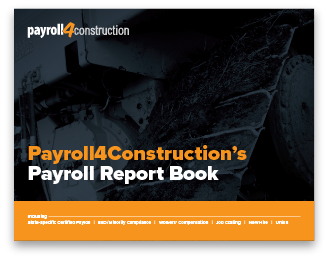Arizona Prevailing Wage Laws: A Complete Guide for Contractors
Overview of Arizona Prevailing Wage RequirementsArizona does not have a state-specific prevailing wage law for public works projects. Instead, contractors working on federally funded construction projects in Arizona must comply with the Davis-Bacon Act, which establishes prevailing wage requirements on projects receiving federal funding.
For any construction company impacted by these federal requirements, Payroll4Construction is here. As a complete payroll service, Payroll4Construction is built to keep contractors compliant with certified payroll reporting and prevailing wage rate determinations under the Davis-Bacon Act.
Keep reading to learn more about Arizona's prevailing wage landscape and how we can help you.
What is Prevailing Wage in Arizona?
Unlike many states, Arizona law specifically prohibits state and local government agencies from requiring prevailing wage provisions in public works contracts.
However, when federal funds are involved, the Davis-Bacon Act requirements apply.
The Davis-Bacon Act requires contractors and subcontractors in the construction industry to pay prevailing wages on federally funded projects when:
- Federal or federally assisted contracts exceed $2,000
- Projects involve construction, alteration, or repair of public buildings and public works
Under this federal law, construction workers must receive minimum hourly wages and fringe benefits based on rates determined by the U.S. Department of Labor for the specific geographic area where the work is performed.
Common federally funded projects in Arizona include:
- Highway and transportation infrastructure projects
- Federal building construction and renovation
- HUD-funded housing developments
- Airport improvements receiving federal grants
- Wastewater treatment facilities with federal funding
- School construction projects with federal assistance
Don’t Let Prevailing Wage Compliance
Slow Down Your BusinessPrevailing Wage Rate Determination
Setting Initial Rates
The U.S. Department of Labor's Wage and Hour Division (WHD) has several crucial responsibilities related to establishing and maintaining prevailing wage rates for federally funded projects. These ensure fairness throughout the contracting process.
The WHD must:
- Determine appropriate prevailing wages for each county or metropolitan area in Arizona, including hourly rates and benefit rates
- Publish these wage determinations on SAM.gov for use in federal projects
- Include these rates in all project specifications and contracts
- Update rates periodically to reflect current local conditions
Rate Calculation Method
The WHD follows a structured approach to determine fair and accurate compensation rates. They establish rates by analyzing:
- Collective bargaining agreements in the locality
- Actual wages paid on similar construction projects in the area
- Survey data from contractors and local wage information
- Various sources of wage information for each Arizona county or region
Prevailing Wage Requirements
Davis-Bacon prevailing wage laws establish minimum compensation standards for workers on federally funded projects. These requirements ensure fair labor practices and create a level playing field for all contractors bidding on federal work in Arizona.
- Contractor

Contractors bear significant responsibility for ensuring project compliance with Davis-Bacon prevailing wage regulations. These requirements apply throughout the entire project lifecycle:
- Understanding which projects trigger Davis-Bacon requirements
- Obtaining applicable wage determinations from contracting agencies
- Paying prevailing wages to all covered workers
- Submitting weekly certified payroll reports
- Posting wage determinations visibly at the job site
- Ensuring all subcontractors comply with Davis-Bacon requirements
How to Submit Prevailing Wage Proof
Davis-Bacon compliance in Arizona requires contractors and subcontractors to maintain comprehensive documentation and submit regular certified payroll reports.
Unlike states with state-level prevailing wage registration systems, Arizona contractors don't need to register with a state agency. Instead, compliance is managed through the contracting federal agency and the U.S. Department of Labor.
Information needed for certified payroll records includes:

- Employee name, address and Social Security number
- Work classification for each worker
- Hourly wage rates paid
- Daily and weekly hours worked, including overtime
- Gross wages earned
- Deductions made from wages
- Net wages paid
- Fringe benefits paid or provided
In essence, contractors need certified payroll records (Form WH-347 or equivalent) submitted weekly to the contracting agency. Contractors must certify that:
- They have paid prevailing wages as specified in the wage determination
- Payroll records are correct and complete
- Each laborer and mechanic has been paid not less than the proper prevailing wage
- No rebates or deductions have been made that would reduce wages below required levels
These certified payroll reports must be submitted weekly during the life of the project and records maintained for three years after project completion.
Compliance, Enforcement and Consequences
The Davis-Bacon system relies on robust federal compliance mechanisms and meaningful penalties to ensure all parties adhere to established standards. These measures protect workers' rights, ensuring compliance with wage standards while maintaining the integrity of federally funded projects in Arizona.
Wage Payment Rules
Davis-Bacon prevailing wage laws establish minimum compensation requirements that cannot be circumvented. This ensures workers receive fair pay for their labor on federally funded projects.
The rules surrounding wage payment include:
- Workers must receive prevailing rates for their job classification as specified in the applicable wage determination
- Rates include both base hourly wages and fringe benefits
- Fringe benefits can be paid as cash wages or through bona fide benefit plans
- Employers cannot pay below these rates, even with worker consent
- Certified payroll records must be submitted weekly
- All overtime must be paid at time-and-a-half the prevailing rate
Violation Consequences
Significant operational and financial repercussions await contractors who fail to comply with Davis-Bacon prevailing wage requirements, potentially jeopardizing their entire business and ability to work on federal projects.
Construction businesses are at risk of penalties, including:
- Contract termination by the federal contracting agency
- Debarment from federal contracts for up to three years
- Assessment of back wages due to employees plus liquidated damages
- Withholding of contract payments until violations are corrected
- Civil penalties and enforcement actions by the U.S. Department of Labor
- Potential criminal prosecution for falsifying payroll records
- Permanent ban from future federal contracting opportunities
Prevailing Wage Whistleblower Protections
Federal law includes anti-retaliation provisions specifically designed to protect workers who report violations of Davis-Bacon prevailing wage requirements or certified payroll discrepancies.
Employees are protected from retaliation when reporting prevailing wage violations:
- Protection from termination
- Protection from disciplinary action
- Protection from discrimination
- Protection from threats or intimidation
These protections apply specifically to matters involving Davis-Bacon compliance. They allow workers to safely report underpayment, misclassification, or certified payroll record falsification without fear of employer retaliation.
Penalties
The legal framework includes substantial financial penalties and establishes clear liability structures to encourage compliance with federal prevailing wage requirements.
Financial consequences include:
- Back wage payments to affected workers
- Liquidated damages equal to unpaid wages
- Contract termination and liability for additional costs to the government
- Civil monetary penalties for violations
- Joint liability between contractors and subcontractors
- Criminal charges for intentional falsification of records
How Payroll4Construction Helps You Stay Compliant
Payroll4Construction is a construction payroll service that specializes in helping contractors and construction companies navigate the complex wage regulations of the Davis-Bacon Act.
These time-saving services reduce administrative hours spent on complex wage calculations and paperwork. In turn, this gives the team peace of mind knowing that Davis-Bacon prevailing wage obligations are being handled correctly.
Prevailing Wage Exceptions
Not all construction projects in Arizona are subject to prevailing wage requirements. Since Arizona has no state prevailing wage law, only federally funded projects trigger these obligations.
Projects are exempt from Davis-Bacon prevailing wage requirements if they:
Receive no federal funding or assistance
- State-funded projects not receiving federal dollars
- Local government projects without federal involvement
- Private construction projects
- County and municipal projects funded entirely with local revenue
Fall below the monetary threshold:
- Federal contracts under $2,000 (though this threshold is rarely an issue for construction projects)
-
Qualify for specific statutory exemptions such as:
- Certain emergency work
- Specific project types explicitly exempted by federal law
- Work performed by volunteers under certain circumstances
It's important to note that Arizona law specifically prohibits state and local governments from imposing their own prevailing wage requirements.
However, contractors must remain vigilant about identifying federal funding sources, as even partial federal funding can trigger Davis-Bacon compliance requirements for the entire project.
When in doubt about whether Davis-Bacon applies, contractors should:
- Request clarification from the contracting agency
- Review contract documents carefully for federal funding disclosure
- Consult with legal counsel or compliance experts
- Follow Davis-Bacon requirements to ensure compliance if federal funding is present



